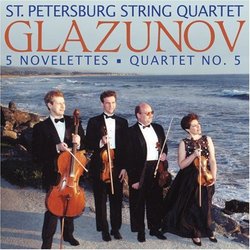| All Artists: St. Petersberg String Quartet Title: Glazunov: 5 Novelettes, Quartet No. 5 Members Wishing: 0 Total Copies: 0 Label: Delos Records Release Date: 4/24/2001 Genre: Classical Styles: Chamber Music, Historical Periods, Classical (c.1770-1830) Number of Discs: 1 SwapaCD Credits: 1 UPC: 013491326221 |
Search - St. Petersberg String Quartet :: Glazunov: 5 Novelettes, Quartet No. 5
 | St. Petersberg String Quartet Glazunov: 5 Novelettes, Quartet No. 5 Genre: Classical
|
Larger Image |
CD Details |
CD ReviewsVery idiomatic performances by the St. Petersburg Quartet. David A. Hollingsworth | Washington, DC USA | 05/28/2001 (5 out of 5 stars) "For those of us who wish that Borodin and Tchaikovsky had written more chamber music than they did (both had written no more than a handful), Alexander Glazunov and even Sergei Taneyev compensated us enormously (and still do). Glazunov in particular kept the genre alive well into 1930 (the date of his last Quartet, the Seventh) and indeed, the Quartets in particular support the notion of Glazunov as the link between the generations of Borodin and Russian/Soviet composers of the 20th Century.There's another linkage worth noting. Like the symphonic works (especially the symphonies), piano music, ballets, and vocal scores, Glazunov's chamber music serve as a link between the two schools (the Tchaikovsky/Tanayev led Moscow Conservatory and the St. Petersburg Conservatory under Rimsky-Korsakov). Therefore, Glazunov's music is admirably blended and diverse. The Five Novelettes (1886) in particular absorb much of the orientalism of the Russian Five, especially the Orientale and the Interludiumin modo antico movements (effectively anticipating Rimsky-Korsakov's "Sadko" written nine years later). But, there's something Tchaikovskian in the lyrical warmth and lucidity in the Alla Spagnuola and the Valse, while All'Ungherese shows Glazunov's admiration towards Hungarian music: its use in Raymonda (esp. in Act III) is startling. There's much of Tchaikovsky's lyrical warmth and sentimentality in Glazunov's Fifth Quartet, arguably his finest. But, there's some dramatic impulses in the first movement that Tchaikovsky would have love to claim as his own. The Scherzo movement and the Finale are very well-written & admirable and the Adagio has real emotional depth in it (the mid section reminds me of the soaring string beginning of the Finale in Tchaikovsky's Pathetique). At first hearing, I felt that the playing of the St. Petersburg Quartet was at times awkward and not as straightforward as the Lyric and the Shostakovich Quartets (in Meridian & Olympia/Melodiya CDs respectively). The phrasings at places are elongated (in the final bar of the Fifth Quartet's First movement for instance) while there are noticeable changes in tempi (like in the mid section of Orientale). But at second hearing, I felt a huge sense of spontaneity behind the music making (an approach more popular in performing a Glazunov work these days) and his music is so much alive and vivid as a result. However, I will not take anything away from the Lyric Quartet under Meridian. The ensemble bring out the coloristic qualities of the Five Novelettes effectively (and the Interludium in modo antico under their hands is spectacular) while their performance of the Fifth is likewise well done and in their own way measures up to the St. Petersburg Quartet. A very tough choice then. For one thing, avoid the Olympia CD reissue of the Five Novelettes performed by the Shostakovich Quartet (the final movement is omitted). However, another Olympia CD has the Fifth with the popular Third "Slavonic" Quartet and Books I & II admirably & exuberently performed by the same team and is a huge library acquisition. Between the St. Petersburg and the Lyric Quartets though, the former add more liveliness to the music while the latter is sonorous yet in the Interludium particularly, highly concentrated. Also, the Meridian recording sound is richer and more blended than Delos, while the sleeve notes for both CDs are good, though not spectacular (inside the CD case for Delos, there's a photograph of a bronze bust of Glazunov done by the German sculptor Karl Altenbernd curiously not mentioned anywhere in this entire CD album). If anything, I would recommend both the Meridian and the Delos recordings of the works for different yet compelling reasons while I would hunt for the Olympia CD (OCD 525) having the Fifth Quartet accompanied by the Third "Slavonic" and Books I & II for Quartet. I for one yearn for new recordings of Glazunov's (and Taneyev's) chamber music (since most of the re-issues have been deleted). Maybe, the Lyric and/or the St. Petersburg Quartets would do us wonders in that regard (which would add to the treasures in our discovery of the romantics and beyond)."
|

 Track Listings (9) - Disc #1
Track Listings (9) - Disc #1